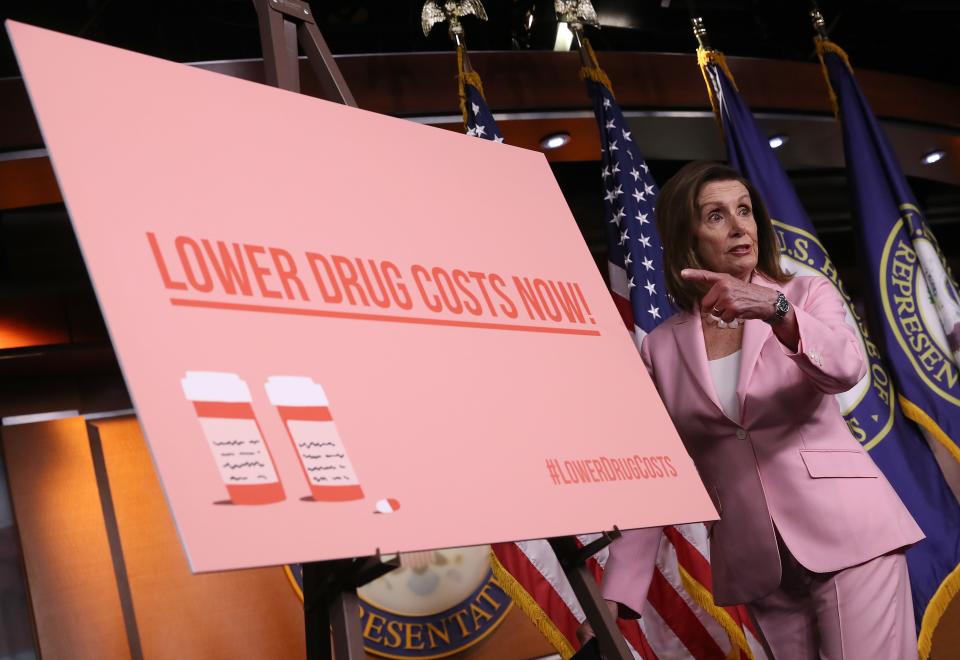High prescription costs are just one way the Big Pharma drug companies rip us off
Last week's House vote to rein in skyrocketing prescription drug prices was overdue. Now it's up to the Senate and President Donald Trump to take action.
Working families and seniors are struggling to pay for the high cost of often life-saving medicines, and have been for years. But price gouging isn’t the only way big drug corporations rip off the American people. Congress needs to stop other abuses, too —starting with the drug industry’s rampant tax dodging.
Anyone who’s filled a prescription lately knows drug prices are out of control. Prices for scores of top drugs have shot up nearly nine times faster than inflation over the past dozen years. And it’s not because the drugs are getting better. Prices of some of the most-prescribed medicines — familiar names like Humira, Lyrica and Truvada — have increased by up to roughly a third, despite no evidence of improved quality.
Individual patients aren’t the only ones getting gouged. Over the past four years, the two big taxpayer-supported health care programs — Medicaid and Medicare — faced price hikes of around 40% each on frequently prescribed medications. That’s eight times faster than general inflation, and even double the inflation rate for prescription drug prices.
High profits and low taxes
No surprise, all that price gouging is making drug makers rich. The 10 biggest American ones — the Pharma Big 10 — racked up almost $69 billion in worldwide profits last year on over $330 billion in sales. Big Pharma’s profit margin of 15% to 20% is about three times higher than the average across the largest 500 companies across all industries.
Despite all those big profits squeezed from consumers, drug corporations don’t pay their fair share of income taxes. The 2017 Trump-GOP tax law handed five of the Pharma Big 10 a collective tax cut of over $8 billion in its first year alone, with more tax breaks coming every year. Separately, the Republican tax law wiped out an estimated $70 billion of the U.S. tax bill drug corporations owed on half a trillion dollars in profits they stashed offshore.

Price gouging and tax dodging characterize the drug corporations’ relationship with the American people: not much give and a whole lot of take. While Big Pharma fails to pay their fair share in taxes to fill public coffers, they’re happy to empty them. Over the past decade, five of the Pharma Big 10 raked in a collective $27 billion in U.S. government contracts.
While drug companies develop and market many life-changing products, they make a fortune from them. And guess who foots much of the bill for the development of these expensive drugs? You and me. Taxpayer-funded research from the National Institutes of Health (NIH) contributed to the development of every one of the over 200 drugs brought to market over a recent seven-year span.
Include the uninsured: My son died from rationing insulin. Democrats' drug pricing plan still wouldn't help him.
Though most of that support is for basic research that underlies specific product discoveries, taxpayer-supported labs like NIH (along with university labs and other non-profits) directly discovered one in eight new drugs produced in the 1990s and early years of this century.
Even when taxpayers fund the discoveries, average Americans often can’t access the medicines they helped pay to create. Instead, the drug corporations reap the rewards. The federal government recently sued Gilead Sciences, which makes billions of dollars off an HIV preventive that can cost patients $20,000 a year, for exploiting taxpayer-funded discoveries without paying us a dime for the privilege.
Lobbying and donations buy power
Big Pharma snatches other goodies from the public cookie jar: excessive government monopolies that keep cheaper drugs off the market; tax breaks for all those irritating TV ads; even sales and tax benefits from the “charities” they set up to help us pay for their overpriced products.
How do they get away with it all? Easy: Money buys power. Drug corporations spend more lobbying Washington decision-makers than any other industry. And the drug industry — counting the corporations, their employees and their political action committees — have donated almost $100 million to federal candidates over the past decade.
A modest proposal: Here's how organ donation reform could save thousands of lives, billions in tax dollars
We need to put a stop to this corporate version of “drug abuse.” It starts with the bill the House passed Thursday, sponsored by House Speaker Nancy Pelosi, that would allow Medicare to negotiate lower prices on up to 250 of the most expensive drugs over a 10-year period. Those discounts could also apply to private health plans, meaning people with employer-sponsored or individual insurance would also have access to cheaper medicine.
Medicare alone would save $500 billion over 10 years, which would be used to add dental, vision and hearing coverage and help low-income seniors afford Medicare. The bill could result in price cuts of 40% to 55% for pharmacy drugs subject to negotiations.
Taming Big Pharma can also be a first step toward ensuring that all corporations contribute to society instead of preying on it. That’s how we build an economy and restore a democracy that works for all of us, not just those at the top.
Margarida Jorge is campaign director of the Lower Drug Prices Now coalition. Frank Clemente is executive director of Americans for Tax Fairness.
You can read diverse opinions from our Board of Contributors and other writers on the Opinion front page, on Twitter @usatodayopinion and in our daily Opinion newsletter. To respond to a column, submit a comment to letters@usatoday.com.
This article originally appeared on USA TODAY: Drug company ripoffs don't end with price gouging and tax dodging

